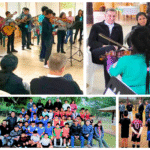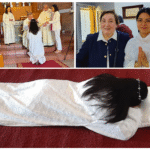
Gospel according to Saint Luke 22:14-23:56:
When the hour came, he took his place at table with the apostles. He said to them, “I have eagerly desired to eat this Passover with you before I suffer, for, I tell you, I shall not eat it again until there is fulfillment in the kingdom of God.” Then he took a cup, gave thanks, and said, “Take this and share it among yourselves; for I tell you that from this time on I shall not drink of the fruit of the vine until the kingdom of God comes.” Then he took the bread, said the blessing, broke it, and gave it to them, saying, “This is my body, which will be given for you; do this in memory of me.” And likewise the cup after they had eaten, saying, “This cup is the new covenant in my blood, which will be shed for you.
“And yet behold, the hand of the one who is to betray me is with me on the table; for the Son of Man indeed goes as it has been determined; but woe to that man by whom he is betrayed.” And they began to debate among themselves who among them would do such a deed.
Then an argument broke out among them about which of them should be regarded as the greatest. He said to them, “The kings of the Gentiles lord it over them and those in authority over them are addressed as ‘Benefactors’; but among you it shall not be so. Rather, let the greatest among you be as the youngest, and the leader as the servant. For who is greater: the one seated at table or the one who serves? Is it not the one seated at table? I am among you as the one who serves. It is you who have stood by me in my trials; and I confer a kingdom on you, just as my Father has conferred one on me, that you may eat and drink at my table in my kingdom; and you will sit on thrones judging the twelve tribes of Israel.
“Simon, Simon, behold Satan has demanded to sift all of you like wheat, but I have prayed that your own faith may not fail; and once you have turned back, you must strengthen your brothers.” He said to him, “Lord, I am prepared to go to prison and to die with you.” But he replied, “I tell you, Peter, before the cock crows this day, you will deny three times that you know me.” He said to them, “When I sent you forth without a money bag or a sack or sandals, were you in need of anything?” “No, nothing,” they replied. He said to them, “But now one who has a money bag should take it, and likewise a sack, and one who does not have a sword should sell his cloak and buy one. For I tell you that this scripture must be fulfilled in me, namely, ‘He was counted among the wicked’; and indeed what is written about me is coming to fulfillment.” Then they said, “Lord, look, there are two swords here.” But he replied, “It is enough!”
Then going out he went, as was his custom, to the Mount of Olives, and the disciples followed him. When he arrived at the place he said to them, “Pray that you may not undergo the test.” After withdrawing about a stone’s throw from them and kneeling, he prayed, saying, “Father, if you are willing, take this cup away from me; still, not my will but yours be done.” And to strengthen him an angel from heaven appeared to him. He was in such agony and he prayed so fervently that his sweat became like drops of blood falling on the ground. When he rose from prayer and returned to his disciples, he found them sleeping from grief. He said to them, “Why are you sleeping? Get up and pray that you may not undergo the test.”
While he was still speaking, a crowd approached and in front was one of the Twelve, a man named Judas. He went up to Jesus to kiss him. Jesus said to him, “Judas, are you betraying the Son of Man with a kiss?” His disciples realized what was about to happen, and they asked, “Lord, shall we strike with a sword?” And one of them struck the high priest’s servant and cut off his right ear. But Jesus said in reply, “Stop, no more of this!” Then he touched the servant’s ear and healed him. And Jesus said to the chief priests and temple guards and elders who had come for him, “Have you come out as against a robber, with swords and clubs? Day after day I was with you in the temple area, and you did not seize me; but this is your hour, the time for the power of darkness.”
After arresting him they led him away and took him into the house of the high priest; Peter was following at a distance. They lit a fire in the middle of the courtyard and sat around it, and Peter sat down with them. When a maid saw him seated in the light, she looked intently at him and said, “This man too was with him.” But he denied it saying, “Woman, I do not know him.” A short while later someone else saw him and said, “You too are one of them”; but Peter answered, “My friend, I am not.” About an hour later, still another insisted, “Assuredly, this man too was with him, for he also is a Galilean.” But Peter said, “My friend, I do not know what you are talking about.” Just as he was saying this, the cock crowed, and the Lord turned and looked at Peter; and Peter remembered the word of the Lord, how he had said to him, “Before the cock crows today, you will deny me three times.” He went out and began to weep bitterly.
The men who held Jesus in custody were ridiculing and beating him. They blindfolded him and questioned him, saying, “Prophesy! Who is it that struck you?” And they reviled him in saying many other things against him.
When day came the council of elders of the people met, both chief priests and scribes, and they brought him before their Sanhedrin. They said, “If you are the Christ, tell us,” but he replied to them, “If I tell you, you will not believe, and if I question, you will not respond. But from this time on the Son of Man will be seated at the right hand of the power of God.” They all asked, “Are you then the Son of God?” He replied to them, “You say that I am.” Then they said, “What further need have we for testimony? We have heard it from his own mouth.”
Then the whole assembly of them arose and brought him before Pilate. They brought charges against him, saying, “We found this man misleading our people; he opposes the payment of taxes to Caesar and maintains that he is the Christ, a king.” Pilate asked him, “Are you the king of the Jews?” He said to him in reply, “You say so.” Pilate then addressed the chief priests and the crowds, “I find this man not guilty.” But they were adamant and said, “He is inciting the people with his teaching throughout all Judea, from Galilee where he began even to here.”
On hearing this Pilate asked if the man was a Galilean; and upon learning that he was under Herod’s jurisdiction, he sent him to Herod who was in Jerusalem at that time. Herod was very glad to see Jesus; he had been wanting to see him for a long time, for he had heard about him and had been hoping to see him perform some sign. He questioned him at length, but he gave him no answer. The chief priests and scribes, meanwhile, stood by accusing him harshly. Herod and his soldiers treated him contemptuously and mocked him, and after clothing him in resplendent garb, he sent him back to Pilate. Herod and Pilate became friends that very day, even though they had been enemies formerly.
Pilate then summoned the chief priests, the rulers, and the people and said to them, “You brought this man to me and accused him of inciting the people to revolt. I have conducted my investigation in your presence and have not found this man guilty of the charges you have brought against him, nor did Herod, for he sent him back to us. So no capital crime has been committed by him. Therefore I shall have him flogged and then release him.”
But all together they shouted out, “Away with this man! Release Barabbas to us.” (Now Barabbas had been imprisoned for a rebellion that had taken place in the city and for murder.) Again Pilate addressed them, still wishing to release Jesus, but they continued their shouting, “Crucify him! Crucify him!” Pilate addressed them a third time, “What evil has this man done? I found him guilty of no capital crime. Therefore I shall have him flogged and then release him.” With loud shouts, however, they persisted in calling for his crucifixion, and their voices prevailed. The verdict of Pilate was that their demand should be granted. So he released the man who had been imprisoned for rebellion and murder, for whom they asked, and he handed Jesus over to them to deal with as they wished.
As they led him away they took hold of a certain Simon, a Cyrenian, who was coming in from the country; and after laying the cross on him, they made him carry it behind Jesus. A large crowd of people followed Jesus, including many women who mourned and lamented him. Jesus turned to them and said, “Daughters of Jerusalem, do not weep for me; weep instead for yourselves and for your children, for indeed, the days are coming when people will say, ‘Blessed are the barren, the wombs that never bore and the breasts that never nursed.’ At that time people will say to the mountains, ‘Fall upon us!’ and to the hills, ‘Cover us!’ for if these things are done when the wood is green what will happen when it is dry?”
Now two others, both criminals, were led away with him to be executed. When they came to the place called the Skull, they crucified him and the criminals there, one on his right, the other on his left. Then Jesus said, “Father, forgive them, they know not what they do.” They divided his garments by casting lots. The people stood by and watched; the rulers, meanwhile, sneered at him and said, “He saved others, let him save himself if he is the chosen one, the Christ of God.” Even the soldiers jeered at him. As they approached to offer him wine they called out, “If you are King of the Jews, save yourself.” Above him there was an inscription that read, “This is the King of the Jews.”
Now one of the criminals hanging there reviled Jesus, saying, “Are you not the Christ? Save yourself and us.” The other, however, rebuking him, said in reply, “Have you no fear of God, for you are subject to the same condemnation? And indeed, we have been condemned justly, for the sentence we received corresponds to our crimes, but this man has done nothing criminal.” Then he said, “Jesus, remember me when you come into your kingdom.” He replied to him, “Amen, I say to you, today you will be with me in Paradise.”
It was now about noon and darkness came over the whole land until three in the afternoon because of an eclipse of the sun. Then the veil of the temple was torn down the middle. Jesus cried out in a loud voice, “Father, into your hands I commend my spirit”; and when he had said this he breathed his last.
The centurion who witnessed what had happened glorified God and said, “This man was innocent beyond doubt.” When all the people who had gathered for this spectacle saw what had happened, they returned home beating their breasts; but all his acquaintances stood at a distance, including the women who had followed him from Galilee and saw these events.
Now there was a virtuous and righteous man named Joseph who, though he was a member of the council, had not consented to their plan of action. He came from the Jewish town of Arimathea and was awaiting the kingdom of God. He went to Pilate and asked for the body of Jesus. After he had taken the body down, he wrapped it in a linen cloth and laid him in a rock-hewn tomb in which no one had yet been buried. It was the day of preparation, and the Sabbath was about to begin. The women who had come from Galilee with him followed behind, and when they had seen the tomb and the way in which his body was laid in it, they returned and prepared spices and perfumed oils. Then they rested on the Sabbath according to the commandment.
How many times did Christ give his life?
Luis CASASUS President of the Idente Missionaries
Rome, April 13, 2025 | Palm Sunday
Isa 50: 4-7; Phil 2: 6-11; Lk 22: 14-23,56
Today, on the eve of the Passion of Christ, we recall with reverence those moments of his life, hoping to imitate saints like Paul of the Cross (1694-1775), Founder of the Congregation of the Passion (Passionists), who understood how meditating on the suffering of Christ not only leads to personal conversion, but also strengthens our love and devotion to God and our neighbor. Our founding father, Fernando Rielo, told us that our nickname, in addition to Identes, is idente missionaries of Christ Crucified.
Of course, as Pope Francis recalled in his first Encyclical, Lumen Fidei (2013):
The greatest proof of the reliability of Christ’s love is found in his death for mankind. If laying down one’s life for one’s friends is the greatest demonstration of love, Jesus offered his life for everyone, even his enemies, to transform hearts (…). In this love, which did not shy away from death to show how much it loves me, it is possible to believe; its totality overcomes all suspicion and allows us to trust fully in Christ.
Giving one’s life for one’s neighbor reaches its fullness with Jesus, but let us note that the intuition of this supreme generosity exists in other spiritual traditions, as manifested, for example, in this simple and surprising Buddhist legend:
A prince named Sattva, while walking in the forest with his brothers, saw a tigress with her cubs. The tigress was extremely weak and hungry, to the point that she could barely move. Her cubs were also weak, unable to feed themselves.
Moved by their suffering and feeling immense compassion, he decided to sacrifice himself to save them. He discreetly moved away from his brothers and threw himself before the tigress, offering himself as food.
Thanks to this act of extreme generosity, the prince embodied the perfection of compassion and selfless sacrifice. He not only relieved the immediate suffering of the tigress and her cubs, but in doing so, he inspired others to practice compassion and generosity.
Within every human being, deep in their heart, is the desire to give their life. On the surface, selfishness often dominates, but when it prevails, it inevitably leads to sadness and despair. Selfishness is the deepest and most painful repression to which we can subject ourselves. This explains why our Founder said that charity is the most healing virtue, which may seem to some to be simply romantic words, but they reflect a profound truth about our nature.
Beyond the images of warm feelings that often characterize our understanding of love, true love always involves a form of death. To love truly has a price, sometimes a very high one. For example, taking the risk of being hurt, of being broken, of losing some part of ourselves.
Giving life in the little things does not always have to be dramatic or extraordinary. It can be the silent effort of a mother who, even though she is exhausted, gets up early to prepare breakfast for her family with true love. It can also be the case of a good student who, despite his own tiredness and multiple occupations, agrees to spend several hours listening to and helping a classmate who is in insurmountable difficulty with a subject.
Daily love can mean leaving on the altar the silences born of bad moods, annoyances or those little doses of self-pity that we seem to enjoy so much. It may require clear honesty, listening with compassion, refraining from harsh judgments or forgiving the hurtful words of others.
It is these everyday gestures of devotion, dedication and selfless love that, although they may seem small, have a great impact on the lives of others. We cannot expect them to change society, nor to achieve an automatic transformation in the person we help, but they leave a clear sign of the divine presence in a limited and small soul like ours.
Jesus uses an image as simple as it is profound to teach us the need to die, which is neither a possibility nor a medium- or long-term objective: Unless a grain of wheat falls to the ground and dies, it remains just a single grain; but if it dies, it bears much fruit. (Jn 12:24). When Jesus talks about death, he is not referring simply to the end of our days in this world, but to a path or, better still, a way of walking, leaving our life like someone who sows another life.
It is clear that we have to be careful to understand the fearsome word “death” properly. That seed seems to be lifeless when we bury it in the ground. But after a while, a green shoot appears, announcing life where before there seemed to be only death. St. Paul had that impression when he said: It is no longer I who live, but Christ who lives in me (Gal 2:20). It is a continuous, constant and fruitful death. This death for Christ does not necessarily have to be something spectacular, dramatic and extremely painful.
It is clear that something deep and intimate within us dies, but at the same time, without waiting, the certainty springs forth that we are giving life, regardless of whether or not it is accepted, even if this giving is not reciprocated or is even rejected and scorned. The case of Christ himself is the perfect example.
Another sublime case is that of the poor widow who gave alms of two small coins (Mk 12:41-44), all she had. The most beautiful thing about that gesture is not the use that would be made of that tiny amount, which perhaps was used improperly or fraudulently, but the fact that Christ found a way for that gesture to have an impact on those present and on all of us who read the Gospel over the centuries.
Christ gave his life in many ways, not only on the Cross.
From the moment he assumed human nature, Christ was already giving himself: He emptied himself, taking the form of a servant, as the Second Reading reminds us. In the institution of the Eucharist during the Last Supper, Christ offered his Body and Blood before the Passion: This is my body, which will be given up for you (Lk 22:19). The culminating moment of his surrender was on Calvary, when he died for the redemption of humanity. In John 19:30, his last words were: All is accomplished, indicating that he had given his life completely.
Let us not forget the form of death that means losing fame, which is often a characteristic in the lives of true Prophets and Founders. And that is another form of pain and humiliation, truly deep and painful.
Today the Gospel already proclaims that what was said by Isaiah (53:12) will be fulfilled in him: He was counted among the wicked.
Those who passed by reviled him… Those who had been crucified with him also reviled him (Mk 15:27 and 32).
Fyodor Dostoyevsky (1821-1881) had a profound vision of the Passion of Christ, influenced by his reflection on human suffering. In his famous novel The Brothers Karamazov, the monk Zósima and the younger brother, the novice Alyosha Karamazov, have a profound conversation about the sacrifice of Jesus, focused not so much on cold theological terms, but on a lived, close and compassionate experience of divine love. On the other hand, Ivan Karamazov, the older brother, tries unsuccessfully to explain an act of appalling cruelty:
A feudal lord hands the son of a woman who refused to accept his advances over to be mauled by mad dogs. This horror leaves Ivan with a wound that cannot heal, an immense pain that cannot be redeemed, in which God is not and cannot be found. Even if the executioners go to hell, even if the mother comes to embrace the executioner, even if God can forgive the criminal… Ivan’s reason (and that of any person) cannot assimilate these misfortunes, which happen by natural accident or through human cruelty.
We see how Alyosha embraces the mystery, Ivan fights it. It is clear that the great Dostoevsky saw the Passion of Christ as the center of the Christian mystery: extreme suffering leading to redemption and absolute love. The monk Zósima teaches the young Alyosha that Christ did not come to impose himself, but to bear the pain of the world; he took upon himself human suffering to redeem us. He makes him understand that Christ does not suffer for men from afar, but with them, in the midst of their pain. His sacrifice is not a legal retribution, but an act of infinite compassion.
In addition to his example and our redemption on the Cross, Christ came, not to explain and rationalize pain, but to show us how we should act in the face of that hurtful reality. That is why he went through all kinds of pain, including the impotence of not being able to bring about our conversion. We too share in that pain when we feel unable to alleviate all the suffering we see around us.
What Christ does is weep with those who weep, as he did with Mary, the sister of the deceased Lazarus, when he imagined the future destruction of Jerusalem (Lk 19:41-44) or in Gethsemane, for the pain of our sins. Jesus’ weeping always meant the same thing: that he would not leave the sufferer alone, as he assured the criminal who asked him not to forget him. When our tears come together, we are even more sure that what the Psalm says is fulfilled: You keep a record of all my anguish and have gathered all my tears in Your bottle; You have recorded each one of them in Your book (Psalm 56:8). God the Father knows that we have cried with Him for our neighbor.
One last parable of love that demands the giving of one’s life.
Do you remember Oscar Wilde’s wonderful story entitled The Happy Prince?
It is the story of a beautiful golden statue of the Prince, which stands in the square of a city. The statue is adorned with fine gold, sapphire eyes and a ruby on the hilt of his sword. From his pedestal, the Prince can see all the misery and suffering of the people, something he was unaware of when he lived in his palace and was happy.
A swallow that had delayed its migration lands on the statue and, seeing that the Prince is crying because of the injustice he is witnessing, decides to help him. The Prince asks the swallow to gradually remove its jewels and gold leafs to give them to the poor and needy.
Despite the cold, the swallow stays with the Prince and fulfills each request. Thus, the statue loses all its external splendor. Finally, the swallow dies of cold and the Prince’s heart of lead breaks. The authorities, seeing that the statue is no longer beautiful, melt it down, but the heart does not melt. They throw it away with the body of the swallow. However, God values their sacrifice and takes them to Paradise as the two most valuable things in the city.
_______________________________
In the Sacred Hearts of Jesus, Mary and Joseph,
Luis CASASUS
President













